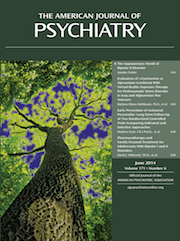Pharmacotherapy and Family-Focused Treatment for Adolescents With Bipolar I and II Disorders: A 2-Year Randomized Trial
Abstract
Objective
Previous studies have found that family-focused treatment is an effective adjunct to pharmacotherapy in stabilizing symptoms in adult bipolar disorder. The authors examined whether pharmacotherapy and family-focused treatment for adolescents with bipolar disorder was more effective than pharmacotherapy and brief psychoeducation (enhanced care) in decreasing time to recovery from a mood episode, increasing time to recurrence, and reducing symptom severity over 2 years.
Method
A total of 145 adolescents (mean age, 15.6 years) with bipolar I or II disorder and a DSM-IV-TR manic, hypomanic, depressive, or mixed episode in the previous 3 months were randomly assigned, with family members, either to pharmacotherapy and family-focused treatment, consisting of psychoeducation (i.e., recognition and early intervention with prodromal symptoms), communication enhancement training, and problem-solving skills training, delivered in 21 sessions over 9 months; or to pharmacotherapy and three weekly sessions of enhanced care (family psychoeducation). Independent evaluators assessed participants at baseline, every 3 months during year 1, and every 6 months during year 2, using weekly ratings of mood.
Results
Twenty-two participants (15.2%) withdrew shortly after randomization. Time to recovery or recurrence and proportion of weeks ill did not differ between the two treatment groups. Secondary analyses revealed that participants in family-focused treatment had less severe manic symptoms during year 2 than did those in enhanced care.
Conclusions
After an illness episode, intensive psychotherapy combined with best-practice pharmacotherapy does not appear to confer advantages over brief psychotherapy and pharmacotherapy in hastening recovery or delaying recurrence among adolescents with bipolar disorder.



